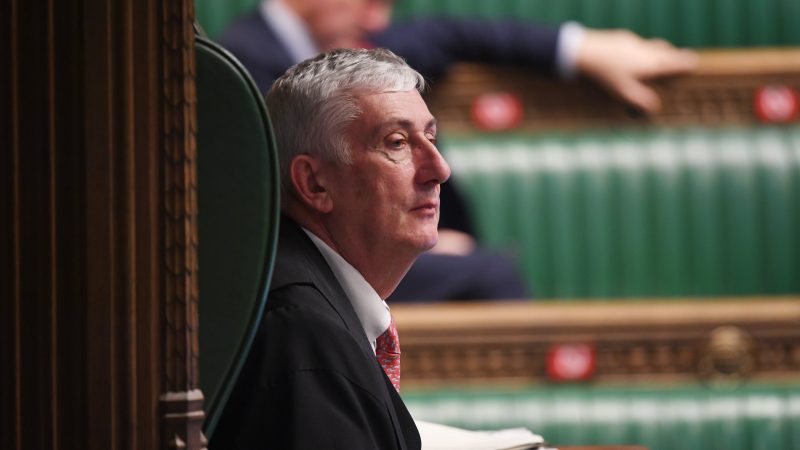
The Speaker’s decision to break with convention last night led to unnecessary and unpleasant scenes in the Commons, and not without reason. His own emotional apology demonstrated that the sanctity of the House and its rules are worth upholding.
But regardless of what the coming days bring for Hoyle, he is absolutely not to blame for the SNP’s ongoing and deeply cynical efforts to undermine Labour’s credibility around the conflict in Gaza.
It is not unreasonable to level criticisms at Starmer, Lammy and co for their prevarication on the issue of a ceasefire. The Labour position is nuanced to the point of meaninglessness, and there are plenty within the movement who feel that a stronger line on the issues of “collective punishment” and civilian deaths would never have harmed Labour’s standing, both internationally and domestically.
An unusual SNP-Tory alliance
But it increasingly seems as if the Opposition-in-Waiting’s only strategy is to set the type of predictable trap we saw yesterday, and try desperately to tar an incoming Labour government with the sorts of ‘we’re all the same really’ smears that have characterised 14 years of dismal Tory rule. In this, they are gleefully and enthusiastically enabled by the likes of Stephen Flynn, the SNP’s bowling ball of a Commons Leader.
When Flynn stood up yesterday to respond to the Clerk of the House’s note, you could have been forgiven for thinking his carefully measured anger (and later apparent apoplexy) was a genuine outpouring of frustration about the plight of Gazans.
But while his opening remarks sought to emphasise this, the real source of his ever-so-righteous indignation was plain to see. The SNP had been snubbed; the good people of Scotland had been (by his extraction, presumably) overlooked, forgotten, their sovereignty ignored. The Westminster arm of Scotland’s incumbent ruling party has always been a protest group of sorts – but their nature as a single-issue party is never revealed in uglier fashion than when they try to stand on their moral high horse.
The SNP and Tories letting Labour ‘win’ shows their fear
"If my mistake is looking after members, I am guilty"@CommonsSpeaker Sir Lindsay Hoyle MP says the safety of MPs is his priority, while addressing growing calls for a vote of no-confidence in his position as Speaker
Politics Hub ➡️ https://t.co/PzaihDen1C
📺 Sky 501 pic.twitter.com/QRhztXrEkN
— Sky News (@SkyNews) February 22, 2024
Let’s just be completely clear. This was an Opposition Day motion which everyone, from the most ardent students of parliamentary procedure to the most casual of politicos, knew carried no weight whatsoever in terms of policy-setting or decision-making.
Under normal circumstances, the government would whip its MPs to vote against, and everyone would go home. But of course, Tory signal-callers were licking their proverbial lips at any hint of an opportunity to embarrass Labour. The Speaker’s intervention unfortunately (or fortunately, depending on your perspective) laid the ground for that manufactured outrage and the ‘walkout’ that is already dominating today’s news cycle.
Yet as the dust settles on last night’s chaotic non-vote, it is Labour’s wording that has been accepted – amid claims that the Government may have felt it could lack the numbers to pass its own amendment.
Choosing to take the lesser of two evils and ‘let’ Labour win is a truly bizarre position that speaks strongly to the fear of a polling wipeout shared on both Tory and SNP benches, and just maybe, an awareness that sensitive foreign policy debates should be given the nuance they deserve.
No party has been above using Israel-Palestine as a wedge
Neither party should take Labour’s potential ascendancy lying down.
North of the border, as well as south, there is a vast quantity of political real estate still to fight for. But of all the issues to politically weaponize, why choose this one?
Starmer’s position is frustrating in that it continues to invite this type of political pincer movement on such a deeply fraught issue, and questions over how much pressure was put on the Speaker’s Office to stave off internal strife are not a good look.
Then again, neither is using civilian deaths to score political points. Whilst no major party has been entirely above using the conflict as a wedge issue, Flynn’s attack dog routine on Gaza, trotted out several times over the last few months, is not the knockout blow he is looking for.
The public despair of this type of embarrassing Westminster wrangling. If they remember it at all come election time, it is not likely to help him and his colleagues overcome the influence of criminal investigations into former senior figures, constitutional roadblocks, questions about relevance, and their attendant sagging poll numbers.
For Labour, last night is a both timely reminder that policy and strategy are very much not the same thing, and also that they are being treated by every major bloc in the Commons as a de facto party of government – with all of the challenges and opportunities that brings.




More from LabourList
‘The High Court judgment brings more uncertainty for the trans community’
‘There are good and bad businesses. Labour needs to be able to explain the difference’
‘This ruling should now remove any remaining barrier to approval of EHRC code’